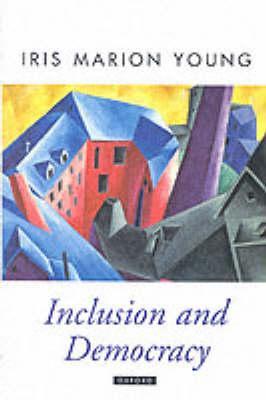Inclusion and Democracy

Inclusion and Democracy
from the point of view of norms of democratic communication, processes of representation and association, and how wide the scope of political jurisdictions should be.
Democratic theorists have not sufficiently attended to the ways processes of debate and decision making often marginalize individuals and groups because the norms of political discussion are biased against some forms of expression. Inclusion and Democracy broadens our understanding of democratic communication by reflecting on the positive political functions of narrative, rhetorically situated appeals, and public protest. It reconstructs concepts of civil society and public sphere as
enacting such plural forms of communication among debating citizens in large-scale societies.
The book considers issues of the scope of the polity at two levels: global and local. The scope of a polity should extend as wide as the scope of social and economic interactions that raise issues of justice. Today this implies the need for global democratic institutions. At a more local level, processes of residential segregation and the design of municipal jurisdictions often result in the ability for actions in one locale to affect those in other locales without those making the
decisions having to include some of those affected in the decision making process. Metropolitan governments which preserve significant local autonomy may therefore be necessary to promote political equality.
PRP: 470.30 Lei
Acesta este Prețul Recomandat de Producător. Prețul de vânzare al produsului este afișat mai jos.
376.24Lei
376.24Lei
470.30 LeiLivrare in 2-4 saptamani
Descrierea produsului
from the point of view of norms of democratic communication, processes of representation and association, and how wide the scope of political jurisdictions should be.
Democratic theorists have not sufficiently attended to the ways processes of debate and decision making often marginalize individuals and groups because the norms of political discussion are biased against some forms of expression. Inclusion and Democracy broadens our understanding of democratic communication by reflecting on the positive political functions of narrative, rhetorically situated appeals, and public protest. It reconstructs concepts of civil society and public sphere as
enacting such plural forms of communication among debating citizens in large-scale societies.
The book considers issues of the scope of the polity at two levels: global and local. The scope of a polity should extend as wide as the scope of social and economic interactions that raise issues of justice. Today this implies the need for global democratic institutions. At a more local level, processes of residential segregation and the design of municipal jurisdictions often result in the ability for actions in one locale to affect those in other locales without those making the
decisions having to include some of those affected in the decision making process. Metropolitan governments which preserve significant local autonomy may therefore be necessary to promote political equality.
Detaliile produsului









